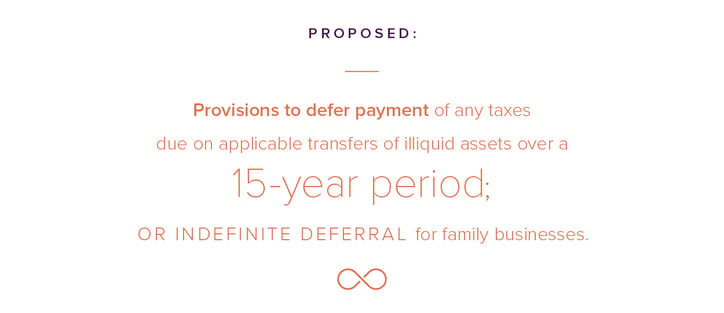In late May, the Biden administration released their first revenue projection budget, or “Green Book,” for the coming year. As anticipated, the administration is looking, in part, to change the transfer tax landscape for high- and ultra-high-net-worth taxpayers to fill the government’s coffers. Surprisingly, the focus does not appear to be on revisions to the traditional estate, gift, and GST exemption levels and tax rates as many practitioners had expected. Instead, Biden’s plan shifts to the imposition of income taxes on appreciated assets when transferred to certain persons or entities at death or as a result of a gift, in addition to traditional transfer taxes.
The proposed revenue plan also looks to collect income taxes on unrealized asset appreciation in trusts after certain holding periods are reached. Many of these provisions, or slight variations of them, have been seen before in Obama-era budgets and, more recently, in proposed acts coming out of the U.S. Senate.
While these proposals are still a long way from becoming laws and much partisan negotiation on the topic is still to come, Biden’s Green Book signals the direction the administration would like to head. Also emerging are the bargaining chips and where the administration’s priorities lie in raising revenue from wealthy taxpayers.
Despite uncertainty on the specific impact of any changes, one thing has become increasingly clear over the past few months culminating with the release of Biden’s Green Book. That is, seismic shifts are coming to the estate planning landscape, especially when coupled with the drastic increases to the capital gain tax also being proposed by the administration (see Preparing for Skyrocketing Capital Gains Rates Under Biden’s Tax Plan).
Proposed tax recognition events at death and gift.
After a $1MM per-person exclusion (with portability of any unused exclusion to a surviving spouse; and indexed for inflation), Biden’s proposal seeks to impose capital gains tax on most appreciated property transferred to individuals (other than surviving spouses) or entities such as trusts. Charities would also be considered exempt transferees. Fortunately, any unrealized losses can generally be used to offset appreciation.

Principal residences would also have their own separate exclusion of $250K per taxpayer, mirroring some of the gain exclusion features principal residences carry when they are sold during the taxpayer’s lifetime. Qualified Small Business Stock also continues to benefit from its gain exclusion features in the Green Book proposal.
The Biden administration proposal also sets an unconventional approach to establishing the transferee’s basis in the property they received. For transfers at death, the beneficiary’s basis in the assets they received will be equal to fair market value (FMV) at the date of death, regardless of whether or not income taxes were due on the assets (i.e., they were shielded by the $1MM exemption described earlier). For gift transfers, however, the donee’s basis will be carried over from the donor, thus continuing the potential exposure to the capital gains income tax regime during life or at the next death.
Illiquid Assets and Family Businesses.
Illiquid assets pose a unique challenge to the Biden administration’s plan to tax appreciated property at death or gift. As such, the Green Book included provisions to defer payment of any taxes due on applicable transfers of illiquid assets over a 15-year period. Furthermore, family businesses (a yet-to-be-defined term) enjoy an indefinite deferral of the tax so long as the business remains “in the family.” If this provision comes to fruition, there will undoubtedly be planning strategies surrounding this nuance.

Intentionally Defective Grantor Trusts.
While some planning aspects of Intentionally Defective Grantor Trusts (IDGTs) remain untouched in the Biden administration’s proposal, the proposal’s attack is focused on the tax-free nature of transactions between the grantor and the trust, curtailing much of the planning strategy’s power. Under the proposal, the sale of an asset by the grantor to the trust would now be a taxable recognition event in most cases.
Trust holding period gain recognition.
Perhaps some of the most disruptive provisions of the administration’s proposed changes to the wealth transfer tax landscape for long-term “dynasty trusts” is the proposed taxation of unrealized appreciation on assets owned by trusts after a certain holding period has been reached. Under the proposal, any appreciated property that has not been subject to an income recognition event within the prior 90 years would be taxed. The 90-year determination period would start as of January 1, 1940, and would eventually impact many trusts already in existence. However, the GST exempt status of trusts was not explicitly impacted by the proposal.

Summary and looking forward.
The shift in focus from transfer tax planning to the new dramatic applications of the capital gains tax on transferred property, as well as basis concerns, will unequivocally change the planning landscape if the Biden Green Book provisions, or variations of them, are actually implemented.
With these changes, however, will come new planning strategies and vehicles to avoid the harshest impacts. Once the new rules of the game are established, estate planners will start to develop strategies from the toolkit they have assembled over decades of changes in tax legislation. Monitoring these early proposals and ideas, however, will give everyone a head start in choosing an effective path forward.
Disclosure
© 2021 Sanderson Wealth Management LLC. This information is not intended to be and should not be treated as legal, investment, accounting or tax advice and is for informational purposes only. Readers, including professionals, should under no circumstances rely upon this information as a substitute for their own research or for obtaining specific legal, accounting, or tax advice from their own counsel. All information discussed herein is current as of the date appearing in this material and is subject to change at any time without notice. Opinions expressed are those of the author, do not necessarily reflect the opinions of Sanderson Wealth Management, and are subject to change without notice. The information has been obtained from sources believed to be reliable, but its accuracy and interpretation are not guaranteed.
Let’s talk about your future.
Schedule a consultation to learn more about our investment services.
Filter Blog Posts
SUBJECT
- Investment Consulting (160)
- Financial Planning (144)
- Tax Consulting (44)
- Estate & Generational Wealth Planning (15)
- Firm News (11)
- Lessons Earned (11)
- COVID-19: Market Watch (10)
- Community (4)
- Philanthropy (4)
- Business Succession Planning (3)
- Prosper Financial Wellness (3)
- Ukraine: Market Watch (1)
AUTHOR
- Angelo Goodenough
- C. Michael Bader, Esq., MBA, CPA, CIMA®
- Caleb Jennings, MBA, CFP®, CIMA®, AIF®
- Cameron Radziwon, LSSBB
- Debbie Todaro
- Evan Kraft, CFP®, CRPC®
- James Warner, MBA, CPA, CFP®, CIMA®
- Joe Bartelo, CPA
- John Gullo, MBA, CFA, CFP®, CIMA®
- John Sanderson, CPA, CIMA®
- Justin Sanderson, MBA, CFP®, CIMA®
- Karen Nicpon, CPA
- Phil Frattali, CFA
- Regyna Waterhouse
- Sanderson Wealth Management
- Tim Domino, CPA, CFP®
- Tucker Weppner, CFP®
